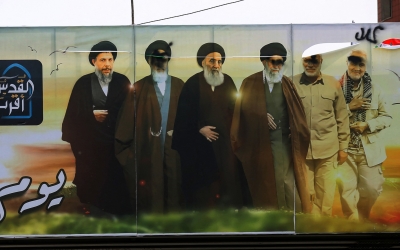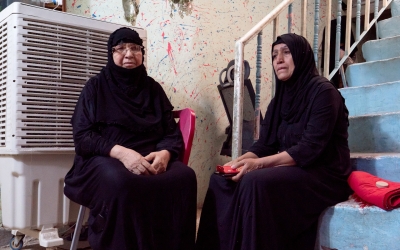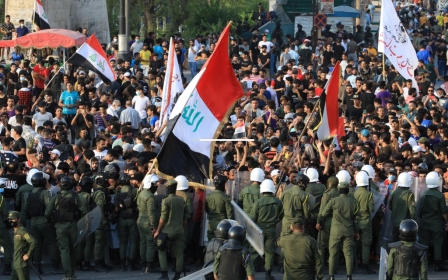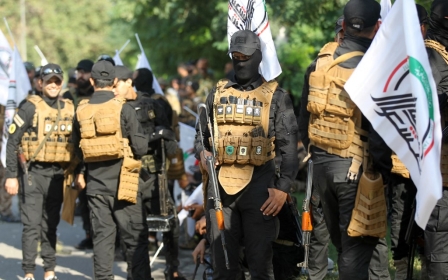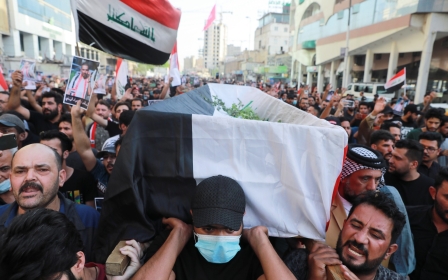Iraq: Arrest of paramilitary commander sparks fears of violent confrontation
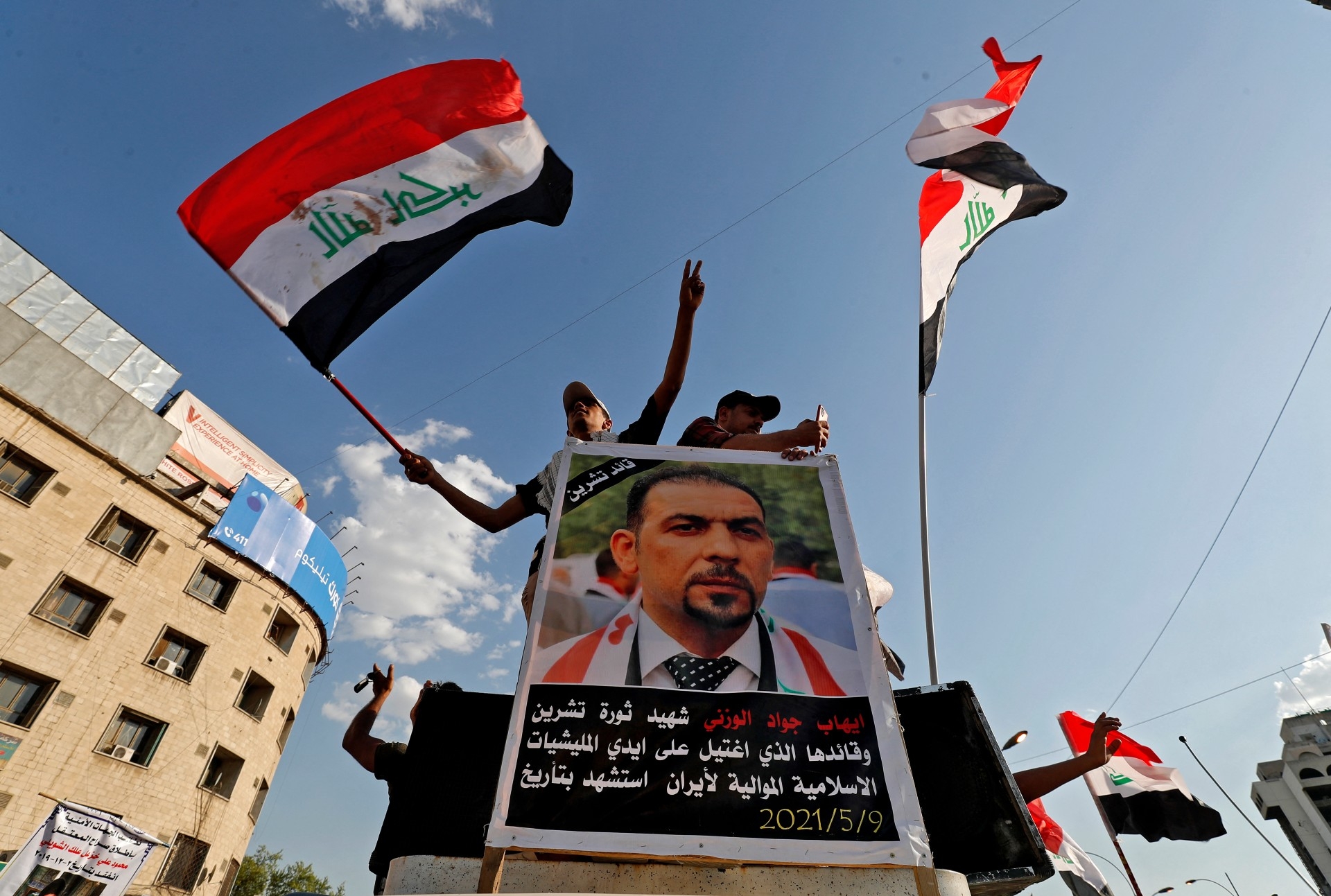
The arrest of a prominent Iranian-backed paramilitary commander accused of an activist’s murder has sent tensions in Baghdad and Karbala skyrocketing and prompted fighters and special forces to roam the capital’s Green Zone armed to the teeth.
Qassim Musleh, commander of the Hashd al-Shaabi paramilitary’s operations in Anbar and also a leading figure in the Iranian-backed Tofuf Brigade, was seized in southern Baghdad on Wednesday morning.
The arrest warrant was leaked to the media and revealed that he was being detained for terrorism crimes.
Musleh is the most prominent Iranian-backed commander to have been arrested on terrorism charges since 2003.
Although his arrest is predicted to cause violent popular reactions in his hometown of Karbala and reprisal attacks by Iranian-backed armed factions in Baghdad, the government is under severe domestic and international pressure to identify and apprehend the killers of activists and journalists linked to the October 2019 anti-government protest movement.
The leaders of Iraq’s Iran-backed armed factions have been on alert since early morning and several meetings have been held to determine how to react to Musleh’s arrest, officials told Middle East Eye (MEE).
Meanwhile, Iraqi authorities have closed the fortified Green Zone, where most government headquarters and diplomatic missions are located in central Baghdad, and put all forces deployed in the city on standby.
The situation inside the Green Zone is currently very tense with a military build-up on both sides, eyewitnesses and officials inside the district told MEE.
The Hashd al-Shaabi has about 5,000 fighters inside the Green Zone. It is reported that some of them are wandering around carrying RPG-7 grenade launchers. In response, the counter-terror forces are also on alert, with one official warning “the coming hours are open to all scenarios".
"This [Musleh’s arrest] is a major blow to them [the Iranian-backed armed factions]. It is greater than any operation that targeted any of them in the past," a senior Iraqi official told MEE.
"Musleh was being watched for a week and his arrest was related to the assassination of an activist in Karbala. We do not know how things will proceed, but the pressure is very great on the prime minister to release him."
Changing allegiance
Musleh was previously the commander of the Ali al-Akbar Brigade, one of the armed factions operating under the government-backed Hashd al-Shaabi umbrella group and also associated with Grand Ayatollah Ali al-Sistani.
However, three years ago he was recruited by Abu Mahdi al-Muhandis, the Hashd al-Shaabi chief of staff killed last year in an air strike authorised by former US President Donald Trump, so he turned against Sistani and joined the Iranian-backed factions.
He subsequently formed the Tofuf Brigade and later became the commander of Hashd’s Anbar operations.
Musleh is active in Karbala, the holy Shia city, and activists there accuse him of suppressing the October 2019 anti-government protests. According to a number of officials and activists who spoke to MEE, Musleh was arrested over accusations he was involved in the killing of Ihab al-Wazni, a prominent activist who was murdered in front of his Karbala home on 9 May.
'Musleh had been in hiding all week because he knew the arrest warrant had been issued against him, and was arrested as he attempted to reach his people in Baghdad'
- Source close to Kadhimi
Wazni’s family have publicly accused Musleh of killing Ihab.
"We charged him with the murder of my brother Ihab. My mother filed a lawsuit against him. We are sure that he was the mastermind of my brother's assassination," Marwan al-Wazni told MEE.
"He may be released due to local and regional pressures, and his group may work to destabilise the security situation. But we have received a promise from the Supreme Judicial Council that the investigation into the murder of Ihab will be professional and will not be subject to any local or regional political pressures or interference."
A senior commander of one of the factions associated with Sistani told MEE: "Musleh’s involvement in the suppression of the 2019 demonstrations and his constant threats to activists in Karbala prompted many to accuse the Mobilisation of the Shrines [factions linked to Sistani] of killing protesters and activists over the past period.”
"People do not believe that he defected from us years ago, and even some government officials still believe that he is supported by us,” the commander added.
“One of the officials involved in the investigation into Wazni’s assassination contacted us two weeks ago to [find out] our position on him [Musleh], so we clearly told him that we have nothing to do with him and that they can arrest him as long as there is evidence against him."
A Hashd al-Shaabi commander close to Iran told MEE that a member of the Prime Minister Mustafa al-Kadhimi's team phoned Sheikh Abal-Mahdi al-Karbalai, one of Sistani’s top aides, a few days ago to ask him about his position on Musleh’s possible arrest.
“Karbalai said they have nothing to do with Musleh and he would not interfere if he got arrested,” the commander said.
A source close to Kadhimi confirmed this account and said that the arrest warrant against Musleh was issued a week ago but he was in hiding.
“Musleh was traveling in a regular car without his bodyguards, which would draw attention to him, so he was arrested without resistance,” the source said.
“He had been in hiding all week because he knew the arrest warrant had been issued against him and was arrested as he attempted to reach his people in Baghdad.”
Paramilitary response
The Hashd al-Shaabi’s leadership has so far issued no position, but the arrest “provoked the displeasure” of Abu Fadak al-Muhammadawi, the organisation's chief of staff, according to one of his close associates.
Several leaders of armed factions, including Qais al-Khazali, the commander of Asaib Ahl al-Haq, and Abu Ali al-Askari, head of Kataeb Hezbollah, have accused Kadhimi of trying to discredit the Hashd’s leaders and stir up sedition between the demonstrators and Iran-backed groups, with the aim of postponing the elections scheduled to be held in October.
'The commanders of armed factions believe if this goes without any serious consequences, Kadhimi will go after them one by one'
- Source close to Abu Fadek
Intense negotiations are being conducted with the prime minister by Abu Fadek, Hashd al-Shaabi leader Faleh al-Fayyad, Hadi al-Amiri, head of the Iran-backed Fatah parliamentary bloc, and the leaders of a number of the armed factions to release Musleh, according to the source.
“As they [the commanders of armed factions] believe if this goes without any serious consequences, Kadhimi will go after them one by one,” the source said.
"There is great pressure on the prime minister to release Musleh, and the operation appears to be suicidal, but it was important to relieve the pressure imposed by the demonstrations on Kadhimi,” an official close to the premier told MEE.
“Fighting may erupt at any minute inside and outside the Green Zone, but I think it is very difficult for [Kadhimi] to back down now. He may make a settlement by handing Musleh over to the Hashd’s security directorate on the condition that he is not released,” he added.
“They may win this round as well, but at least the people will understand the reality of the threats the government faces.”
Middle East Eye delivers independent and unrivalled coverage and analysis of the Middle East, North Africa and beyond. To learn more about republishing this content and the associated fees, please fill out this form. More about MEE can be found here.


